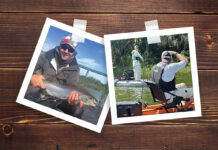Perfectly casting a fly rod is immensely satisfying. The carefully timed pause, patiently loading the backcast, the effortless loop silently flowing forward with tight parallel lines, unrolling and dropping the fly with pinpoint accuracy—it doesn’t get much better than that.
While spinning gear anglers huck a lure with hardly a thought, fly anglers spend as much energy delivering their fly as working it through the water. For fly fishers, the cast has taken on mythical reverence, a visible show of competency. I can identify a fly fishing novice by his cast from 300 yards away. A master caster gathers spectators. None of this has anything to do with catching fish.
Master Caster: Why Fly Fishing Isn’t Really about Catching
There was a time when all fishing was fly fishing. Spin fishing didn’t take off until after the Second World War.
From the beginning, casting has been its own sport. Casting tournaments started in the 1300s. The sport really hit its peak in the 1860s when professional competitive fly casters became as famous as pro athletes in more high-profile sports.

Today, the American Casting Association (ACA) in North America and International Casting Sport Federation in Europe are the arbitrators of the sport. In 2011, Henry Mittel set the current ACA two-handed casting record at 294 feet. For the rest of us, sending a fly more than 60 feet shows some serious skill.
The four categories of casters
Trade workers are categorized by experience into novice, apprentice, journeyman and master. Novices are so new to the field they don’t know what they don’t know. In fly fishing, novices grab a department store combo and whip it back and forth like a windshield wiper. After a couple of wind knots, cracking off flies and throwing open loops to nowhere, the fly rod may end up in the garbage.
Apprentices, on the other hand, know they don’t know how to cast. Apprentices seek help from a friend, relative, casting instructor or YouTube video. The trusted expert offers direction and sets an apprentice on the right path. Everyone needs help working out the stop positions and basic casting mechanics. At the early stage, it is difficult to focus on the cast and not get caught up with catching fish. Apprentices need hours of lawn casting to reach the next level.
Journeymen have casting figured out. With the appropriate hours invested, these anglers have honed their casting craft, and can competently deliver their flies with tight loops. Even at this stage though, casting is a conscious effort requiring appropriate attention to detail. Not every cast is perfect. For these folks, the perfect cast is satisfying and fleeting. Replicating the delivery is not guaranteed. An avid angler can spend his whole life happy in the journeyman category.
Masters are in a different league. I know when I see a fly casting master in action. No matter the challenge, masters show innate artistry and ease of motion. The cast is beautiful, delivered with subtlety and hints at something greater.
Masters have an invisible aura of confidence, as though they telepathically control the line. The skill set is not written down. It is found only through immersion in the craft.
Subtleties in timing, gentle variations in force and perfect stops are reserved for casters willing to dedicate the time to discover these skills. A casting master has more in common with a karate black belt.
Casting is all about craftsmanship
I am in awe of good fly casting. But I don’t think the fish care. If the fly lands in front of a fish and looks like the real thing, the fish will eat it. What happened in the air beforehand is of no concern to the fish.
But the cast means everything to me. This is where care and pride in the fly casting craft are mine alone, regardless of catching fish. Laying out a perfect cast is a noble and existential achievement.
Even though the ultimate goal is catching fish, casting can be a measure of skill and mastery beyond the fish count. If the fish don’t bite, I can always work on my backcast and take pride in my loops.
When casting is this much fun, fooling a fish is just a bonus. | Feature photo: Chris Funk










Man… this is compelling… I really need to learn how to do this… great post. Thank you.